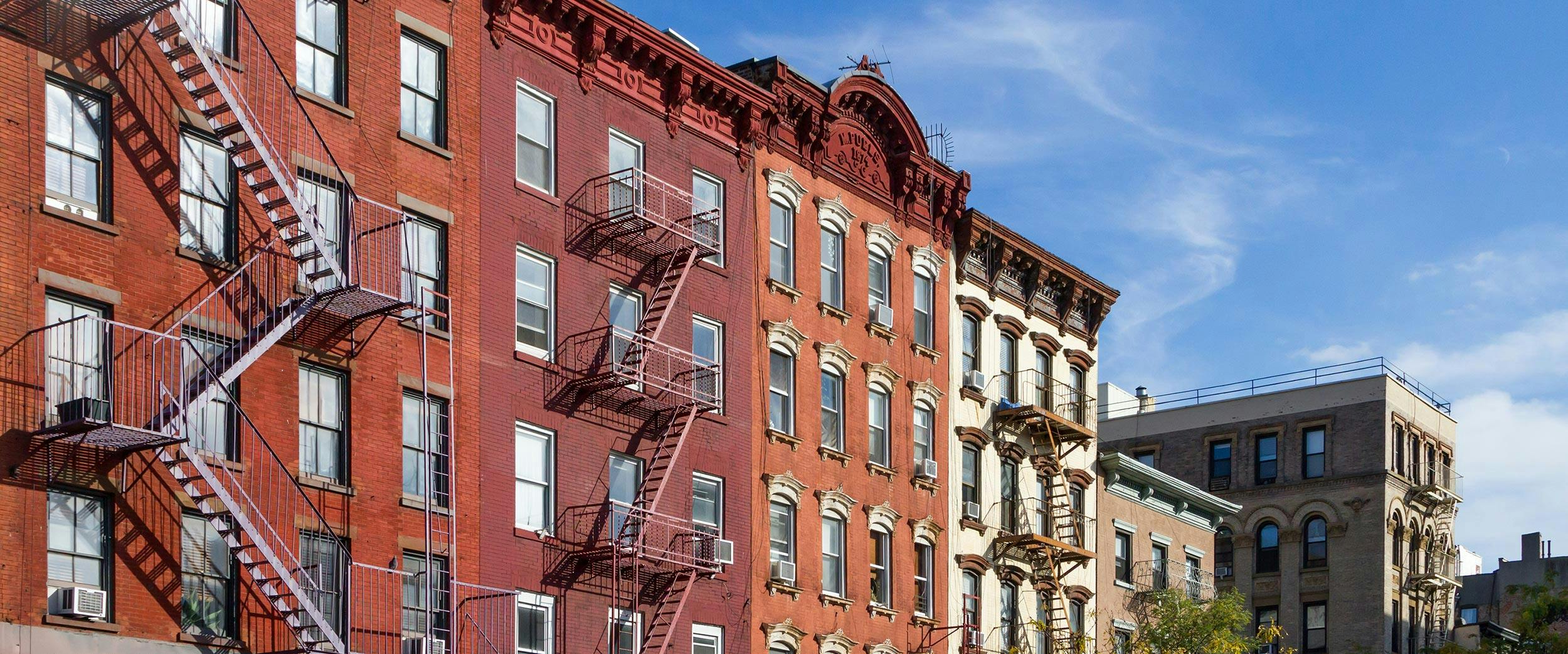
If you’re considering growing your rental property portfolio, chances are you’ve seen the option to purchase a co-op, especially if you’re in New York City or another major US city where co-ops are common. However, when you decide to purchase a property to rent out, it’s key to know what you’re getting into. You want to know if it will be a good investment, weighing the risks and challenges with its ability to pay itself off.
That’s just the thing about co-ops—you need to know what you’re getting into before you decide to buy it. And for an investor, we don’t think it’s the best move. We’ll dive into why below and let you come to your own conclusion.
What is a Co-Op?
Simply, a co-op is short for housing cooperative. When you buy a unit in a co-op, you’re actually buying shares in the corporation that owns the building. Technically, you’re not buying property/real estate. Rather, you’re purchasing the exclusive right to live in that particular apartment and become a shareholder. The bigger (and more expensive) the unit, the more shares of the corporation you own.
Data shows 75% percent of NYC’s purchasable housing stock is made of co-ops. Co-ops tend to be the older, pre-war buildings. Some highly prestigious NYC co-ops include 720 Park Avenue, The Beresford, 839 Fifth Avenue, and The Dakota, pictured below.

Like a COA (or HOA), co-ops are run by a board of elected managers, who are residents of the building. They impose the rules (typically much more strict than your typical COA) that involve everything from pet policies to subletting allowances to guest limitations to moving restrictions to what contractors you’re allowed to use for renovations, and so on. Co-op members (aka unit owners) are also likely to be more active in the management in the property and likely value social interaction with other residents more.
Co-ops tend to be less expensive than condos. This is because condos are often newer construction, offer a vast amount of modern amenities, appeal to both owners and investors (aka are more competitive), are more liquidable, and are in shorter supply in some markets.
How Do You Buy a Co-Op?
The co-op board can be highly restrictive based on who they allow to purchase apartments. Per the Fair Housing Act, boards cannot discriminate applicants based on race, color, religion, sex, handicap, age, familial status, and national origin. Many states and the District of Columbia also ban housing discrimination based on sexual orientation and gender identity. However, co-ops often have guidelines in terms of potential buyers’ liquid assets, income, and character.
During the application and approval process, be ready for co-op boards to look into many personal aspects of your finances and life including your net worth, income, debt, tax returns, and resident status. They’ll look into your references, conduct a background check, and interview you. From all the data they gather, they’ll make a decision on whether they approve you or not. Sound subjective? It definitely is—it’s like screening someone for a high-stakes job to determine if it’s the right fit. Buyers usually work with their real estate brokers to help them assemble their board package (aka all of the paperwork and documentation) and prepare for the interview.
Additionally, co-ops want more than 20% put down—some might require a 25% down payment or even more. They may also require you to work with a specific lender to take out a “share loan.” This loan works like a mortgage in the sense you make payments to a lender. You’ll also get a similar tax treatment as homeowners would to deduct yearly interest on your loan. At the closing, you’ll sign a lease to formalize your right to occupy the apartment you bought.
You want to review the financials of the co-op to make sure it’s well managed. Because the co-op owns the building (unless it’s a “leasing co-op”), you want to make sure you’re not forking money over to an organization that could go bankrupt. Then, you’re out of your money and your apartment.
Due to the nature of the co-ops as a community, co-ops are heavily owner-occupied. Those who complete the screening and buying process truly want to live in the building and enjoy the exclusivity it affords them.
Other Costs of Owning a Co-Op Apartment
In addition to making your loan payments, you’re responsible for paying your share of the building’s running and maintenance costs. And if someone doesn’t pay their share, everyone else has to cover the difference—that’s one of the reasons why the financial screening is so in-depth. These costs are paid monthly to the corporation and are billed at the market rate of costs; that is, when the cost of living rises, so do these costs.
If there’s a mortgage on the property itself in the name of the corporation, the costs of the whole building’s mortgage are included in your monthly fees, which are calculated by how many shares you own. Your “share loan” only covers the cost of buying into the corporation, rather than paying for the physical mortgage on the property. You can deduct your share of the interest in your taxes, though. However, the unit’s property taxes are included in your fees, which is one less thing you have to pay out of pocket, unlike condo ownership. Finally, you’re responsible for your own utility costs and insurance costs as well.
What Makes a Condo Different Than a Co-Op?
A condo is an apartment you buy outright. Like traditional homeownership, you own the property in title and deed—it is legally yours and no one can tell you what to do with it as long as you abide by the laws that govern the area in which the condo is located. You will likely become a member of a COA and share basic building infrastructure, hallways and building entrances, and amenities.
Condos are also much less selective in the approval process. Like buying other property, you need to show your mortgage commitment and demonstrate that you have enough funds to pay taxes and other charges (e.g. association fees). You also don’t have to sweat through an interview. Though your requirement for a down payment will be more flexible than that of a co-op, you do have to purchase title insurance and pay a mortgage tax (and maybe insurance if you paid a low down payment), which are costs not associated with buying a co-op.
Condos also have much higher liquidity. Because the approval process is simpler, it’s easy to get the unit on the market and have interested buyers lining up. This is yet another reason why condos tend to be higher in price—they’re more investor-friendly.
Types of Co-Ops
There are three different types of co-ops you might see when shopping around. They differ based on pricing and ownership of the building.
- Market Rate Co-op: Members can buy and sell shares at whatever rate the market bears
- Limited Equity Co-op: The board sets restrictions on the price at which shares may be bought and sold
- Leasing Co-op: The corporation leases the building instead of owning it and does not build equity
Can You Rent Out Your Co-Op?
Yes and no. It really depends on the rules of the co-op that surrounding renting. Co-ops typically have strict rules in place regarding how long within a certain timeframe you may rent out the unit. This means you might be able to rent it out only two years out of every five years—which may limit the kind of leases you can offer as well. It can vary as some buildings may allow tenants to stay past their lease term on a month-to-month lease. Additionally, it’s common to have a clause stipulating that you must have lived in the apartment a particular length of time before being able to rent it out.
Renters or sublets will also likely be subject to board approval and have to go through a similar application process buyers complete. There are often fees you’ll be charged for subletting the apartment that you’ll have to pay to the building, the managing agent, or both.
Should Property Investors Invest in Co-Ops?
That’s up to you and what your business goals are, and your intended use of the unit. Co-ops do typically cost less than condos, which is a bonus if you’re looking for something more affordable. However, you usually need to put more down and work with a lender you likely haven’t worked with before. When it comes to investments, condos are definitely more competitive and pricier because there are fewer and you’re contending with other investors and owner-occupants.
Co-ops are also less liquidable than condos and are more complicated and expensive to sell. Aside from dealing with the co-ops’ rules, procedures, and politics surrounding selling, the seller is responsible for the “flip tax” aka the sale/transfer fee (can be up to 2% of the sale price), in addition to transfer taxes, buyer’s and sellers brokers fees, miscellaneous closing costs. That alone can be 10% of the sale price.
If you’re looking to immediately rent out the unit, a co-op might not be the choice for you. But if you’re looking to have a place you can call home in a city you like, with the option to rent out in the future, a co-op would be a sound choice. Maybe you’d consider purchasing a co-op if you have a child attending college in a city and treat it as their home for a few years. All in all, condos offer you more flexibility, autonomy, and ease of buying/selling, things investors desire.
Want to project how much you’d make if you were to purchase and rent out a co-op? Plug your numbers into our Real Estate Investment Calculator to get a clearer picture. And while you’re at it, run the numbers on your other rental properties too.
